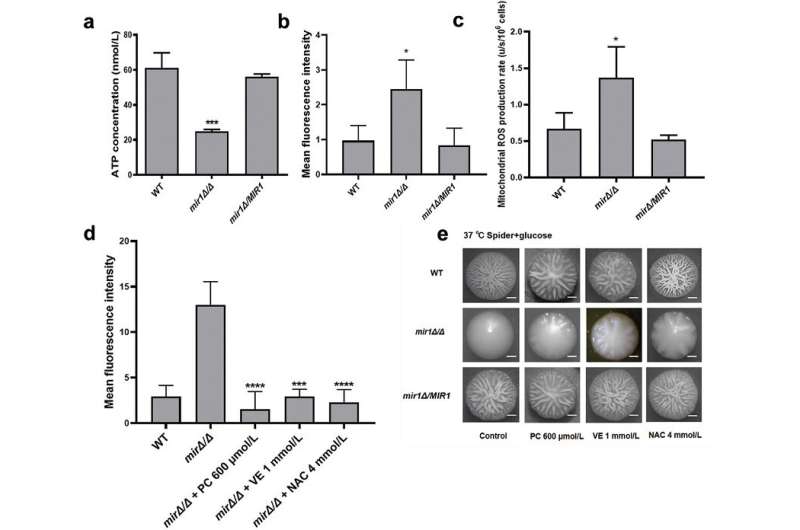This article has been reviewed according to Science X's editorial process and policies. Editors have highlighted the following attributes while ensuring the content's credibility:
fact-checked
proofread
Study finds mitochondrial phosphate carrier plays an important role in virulence of Candida albicans

In a paper published in Mycology, Professor Yan Wang's team found that in both nematode and murine infection models, the lack of MIR1 gene, which encodes mitochondrial phosphate carrier, can lead to severe virulence defects in Candida albicans.
Further studies showed that virulence defects were associated with defects in hyphal formation and reactive oxygen species (ROS) production. This study shows that MIR1 plays an important role in C. albicans mitochondrial function, filamentation and virulence, and may be a promising antifungal target.
In the Caenorhabditis elegans candidiasis model, the survival rate of the wild-type strain infected group dropped to about 20% at 120 h, while the survival rate of the mir1Δ/Δ-infected group remained about 90% at 120 h. Similar results were obtained in the murine model. None of the mice infected with mir1Δ/Δ mutant died during 21 days of observation, while all of the mice infected with the wild type or the mir1Δ/MIR1 mutant died within 8 days.
The team decided to further investigate why MIR1 plays an important role in virulence of C. albicans. Hyphal formation is an important virulence factor for C. albicans to invade the host and exert virulence. The team studied the hyphal formation ability of mir1Δ/Δ mutants under different culture conditions.
Interestingly, the mir1Δ/Δ mutant exhibited severe filamentation defects on the hypha-inducing agar media, including YPD + serum, Lee, Spider + glucose, SLAD, SLD, and YPS. They further found that the loss of MIR1 resulted in non-fermentable carbon utilization defects, ATP reduction, and reactive oxygen species (ROS) accumulation in C. albicans.
The antioxidant proanthocyanidins, vitamin E, and N-acetyl cysteine could reduce intracellular ROS level and partially rescue the filamentation defects of the mir1Δ/Δ mutant. Thus, the loss of MIR1 led to a loss of virulence in C. albicans, and this effect was related to the defects in hyphal formation caused by ROS accumulation.
Then a new question arises: How does ROS accumulation affect the formation of hyphae in C. albicans? Was it due to the blockage of the hyphal-promoting signaling pathways?
The team tested the expressions of 11 hypha-related genes and they found that many of the genes, including ECE1, HWP1, HGC1, HYR1, CST20, CEK1, CPH1, CYR1, TPK1, EFG1 and RIM101, were down-regulated in the mir1Δ/Δ mutant. Moreover, these down-regulations could be partially rescued by the addition of the antioxidant NAC. Collectively, ROS inhibited hyphal formation of mir1Δ/Δ mutant, partially by down-regulating the expressions of hypha-related genes.
"This study shows MIR1 plays a vital role in respiration, filamentation and virulence of C. albicans, and disrupting respiration through blocking the mitochondrial phosphate carrier may be an effective antifungal strategy," said Professor Wang.
More information: Qiao-Ling Hu et al, Mitochondrial phosphate carrier plays an important role in virulence of Candida albicans, Mycology (2024). DOI: 10.1080/21501203.2024.2354876
Provided by Tsinghua University Press



















